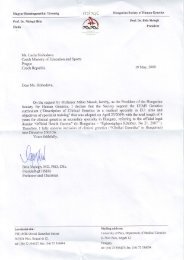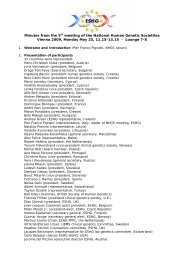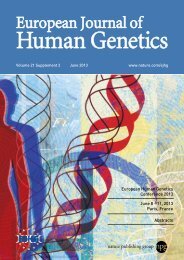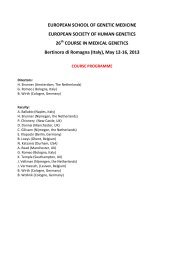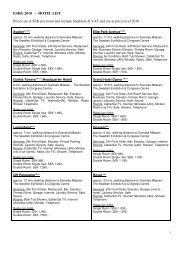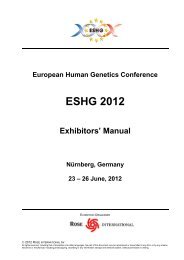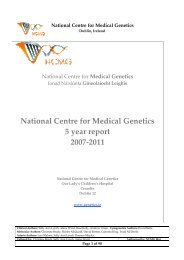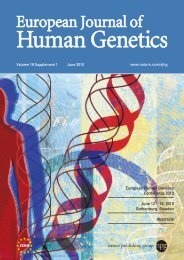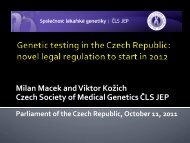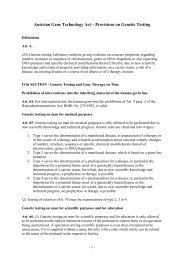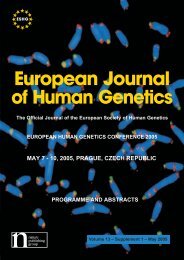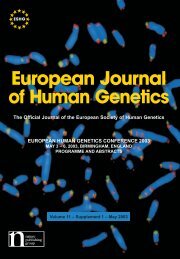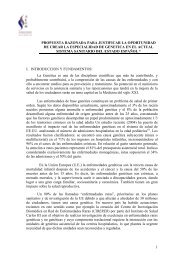- Page 1 and 2:
Volume 16 Supplement 2 May 2008 www
- Page 3 and 4:
Committees - Board - Organisation E
- Page 5 and 6:
Plenary Lectures ESHG PLENARY LECTU
- Page 7 and 8:
Plenary Lectures 6 Medical Genetics
- Page 9 and 10:
Concurrent Symposia ESHG CONCURRENT
- Page 11 and 12:
Concurrent Symposia s04.1 microRNA
- Page 13 and 14:
Concurrent Symposia 0 use of positi
- Page 15 and 16:
Concurrent Symposia s10.2 Non-invas
- Page 17 and 18:
Concurrent Symposia s13.1 Dysregula
- Page 19 and 20:
Concurrent Sessions ESHG CONCURRENT
- Page 21 and 22:
Concurrent Sessions receptor than t
- Page 23 and 24:
Concurrent Sessions an autosomal re
- Page 25 and 26:
Concurrent Sessions reporting, and
- Page 27 and 28:
Concurrent Sessions c06.3 clinical
- Page 29 and 30:
Concurrent Sessions c07.5 VLDLR (ve
- Page 31 and 32:
Concurrent Sessions 317,503 single
- Page 33 and 34:
Concurrent Sessions MYCN , E2F3 and
- Page 35 and 36:
Concurrent Sessions limb or thoraci
- Page 37 and 38:
Concurrent Sessions APC, BRCA1 and
- Page 39 and 40:
Concurrent Sessions identified 215
- Page 41 and 42:
Clinical genetics ESHG POSTERS P01.
- Page 43 and 44:
Clinical genetics In Cyprus, the mu
- Page 45 and 46:
Clinical genetics gene . Most of th
- Page 47 and 48:
Clinical genetics are indeed more d
- Page 49 and 50:
Clinical genetics P01.037 Validatin
- Page 51 and 52:
Clinical genetics 17 PKU patients f
- Page 53 and 54:
Clinical genetics L185R missense mu
- Page 55 and 56:
Clinical genetics P01.064 isolation
- Page 57 and 58:
Clinical genetics leles- is in acco
- Page 59 and 60:
Clinical genetics Sapienza” Unive
- Page 61 and 62:
Clinical genetics P01.090 Fragile X
- Page 63 and 64:
Clinical genetics P01.099 Deletion
- Page 65 and 66:
Clinical genetics other CNPs, the 1
- Page 67 and 68:
Clinical genetics FRAXA is the most
- Page 69 and 70:
Clinical genetics and PT 19 cm. Nec
- Page 71 and 72:
Clinical genetics P01.133 White mat
- Page 73 and 74:
Clinical genetics curved radii, uln
- Page 75 and 76:
Clinical genetics ered at the 33 rd
- Page 77 and 78:
Clinical genetics P01.160 character
- Page 79 and 80:
Clinical genetics P01.169 A variant
- Page 81 and 82:
Clinical genetics matological anoma
- Page 83 and 84:
Clinical genetics sition was identi
- Page 85 and 86:
Clinical genetics women ranges by p
- Page 87 and 88:
Clinical genetics MD2I or MDC1C sho
- Page 89 and 90:
Clinical genetics P01.215 the ctG r
- Page 91 and 92:
Clinical genetics pansion . Longer
- Page 93 and 94:
Clinical genetics frequency of this
- Page 95 and 96:
Clinical genetics mana, CUCS, Unive
- Page 97 and 98:
Clinical genetics P01.253 The first
- Page 99 and 100:
Clinical genetics consistent findin
- Page 101 and 102:
Clinical genetics P01.270 Genetic s
- Page 103 and 104:
Clinical genetics P01.279 Dilated c
- Page 105 and 106:
Clinical genetics objectives of our
- Page 107 and 108:
Clinical genetics P01.298 Hyperphos
- Page 109 and 110:
Clinical genetics P01.307 maternal
- Page 111 and 112:
Clinical genetics CM in monozygotic
- Page 113 and 114:
Clinical genetics P01.325 mowat-Wil
- Page 115 and 116:
Clinical genetics P01.334 Identific
- Page 117 and 118:
Clinical genetics birth defects is
- Page 119 and 120:
Clinical genetics The cause of this
- Page 121 and 122:
Clinical genetics were assumed to b
- Page 123 and 124:
Cytogenetics P01.369 three novel mu
- Page 125 and 126:
Cytogenetics P02.008 Reconfirmation
- Page 127 and 128:
Cytogenetics mosomal rearrangement
- Page 129 and 130:
Cytogenetics otide-based array plat
- Page 131 and 132:
Cytogenetics rangements ranged betw
- Page 133 and 134:
Cytogenetics 593 kb microdeletion a
- Page 135 and 136:
Cytogenetics We herewith report two
- Page 137 and 138:
Cytogenetics cise etiological diagn
- Page 139 and 140:
Cytogenetics deleted region contain
- Page 141 and 142:
Cytogenetics P02.078 mental Retarda
- Page 143 and 144:
Cytogenetics present on the right s
- Page 145 and 146:
Cytogenetics P02.096 Delineation of
- Page 147 and 148:
Cytogenetics P02.106 Aneuploidy of
- Page 149 and 150:
Cytogenetics biologic (cytogenetic)
- Page 151 and 152:
Cytogenetics - 60 .0) per 100 cells
- Page 153 and 154:
Cytogenetics netic map of deleted r
- Page 155 and 156:
Cytogenetics phic at delivery . Min
- Page 157 and 158:
Cytogenetics (according to question
- Page 159 and 160:
Cytogenetics P02.160 characterizati
- Page 161 and 162:
Cytogenetics DISCUSSION: In this st
- Page 163 and 164:
Cytogenetics from peripheral blood
- Page 165 and 166:
Cytogenetics did not influence upon
- Page 167 and 168:
Cytogenetics sented with ambiguous
- Page 169 and 170:
Cytogenetics normalities, cytogenet
- Page 171 and 172:
Cytogenetics P02.215 cytogenetic an
- Page 173 and 174:
Cytogenetics matozoa from carriers
- Page 175 and 176:
Cytogenetics of spermatogenesis in
- Page 177 and 178:
Prenental diagnostics Genotype Infe
- Page 179 and 180:
Prenental diagnostics T21 samples s
- Page 181 and 182:
Prenental diagnostics be withdrawn
- Page 183 and 184:
Prenental diagnostics The Consortiu
- Page 185 and 186:
Prenental diagnostics Here we descr
- Page 187 and 188:
Prenental diagnostics service deliv
- Page 189 and 190:
Prenental diagnostics cal Universit
- Page 191 and 192:
Prenental diagnostics nuchal transl
- Page 193 and 194:
Prenental diagnostics etal anomalie
- Page 195 and 196:
Cancer genetics forms . The typical
- Page 197 and 198:
Cancer genetics P04.012 A novel PtE
- Page 199 and 200:
Cancer genetics P04.021 comparative
- Page 201 and 202:
Cancer genetics P04.029 characteris
- Page 203 and 204:
Cancer genetics mutations detected
- Page 205 and 206:
Cancer genetics deleterious mutatio
- Page 207 and 208:
Cancer genetics Research Centre, Mo
- Page 209 and 210:
Cancer genetics P04.064 Dissection
- Page 211 and 212:
Cancer genetics P04.072 Acute promy
- Page 213 and 214:
Cancer genetics P04.081 Discordance
- Page 215 and 216:
Cancer genetics ity of the malignan
- Page 217 and 218:
Cancer genetics Method: mRNA level
- Page 219 and 220:
Cancer genetics preparations were o
- Page 221 and 222:
Cancer genetics ries.The identifica
- Page 223 and 224:
Cancer genetics P04.127 FGFR3 mutat
- Page 225 and 226:
Cancer genetics Our experience show
- Page 227 and 228:
Cancer genetics way consists of thr
- Page 229 and 230:
Cancer genetics and/or prognostic m
- Page 231 and 232:
Cancer genetics P04.162 HER-2/neu A
- Page 233 and 234:
Cancer genetics controls, by hetero
- Page 235 and 236:
Cancer genetics P04.179 molecular g
- Page 237 and 238:
Cancer genetics there are no change
- Page 239 and 240:
Cancer genetics P04.197 mutation in
- Page 241 and 242:
Molecular and biochemical basis of
- Page 243 and 244:
Molecular and biochemical basis of
- Page 245 and 246:
Molecular and biochemical basis of
- Page 247 and 248:
Molecular and biochemical basis of
- Page 249 and 250:
Molecular and biochemical basis of
- Page 251 and 252:
Molecular and biochemical basis of
- Page 253 and 254:
Molecular and biochemical basis of
- Page 255 and 256:
Molecular and biochemical basis of
- Page 257 and 258:
Molecular and biochemical basis of
- Page 259 and 260:
Molecular and biochemical basis of
- Page 261 and 262:
Molecular and biochemical basis of
- Page 263 and 264:
Molecular and biochemical basis of
- Page 265 and 266:
Molecular and biochemical basis of
- Page 267 and 268:
Molecular and biochemical basis of
- Page 269 and 270:
Molecular and biochemical basis of
- Page 271 and 272:
Molecular and biochemical basis of
- Page 273 and 274:
Molecular and biochemical basis of
- Page 275 and 276:
Molecular and biochemical basis of
- Page 277 and 278:
Molecular and biochemical basis of
- Page 279 and 280:
Molecular and biochemical basis of
- Page 281 and 282:
Molecular and biochemical basis of
- Page 283 and 284:
Molecular and biochemical basis of
- Page 285 and 286:
Molecular and biochemical basis of
- Page 287 and 288:
Molecular and biochemical basis of
- Page 289 and 290:
Molecular and biochemical basis of
- Page 291 and 292:
Genetic analysis, linkage, and asso
- Page 293 and 294:
Molecular and biochemical basis of
- Page 295 and 296:
Molecular and biochemical basis of
- Page 297 and 298:
Molecular and biochemical basis of
- Page 299 and 300:
Molecular and biochemical basis of
- Page 301 and 302:
Molecular and biochemical basis of
- Page 303 and 304:
Molecular and biochemical basis of
- Page 305 and 306:
Molecular and biochemical basis of
- Page 307 and 308: Molecular and biochemical basis of
- Page 309 and 310: Molecular and biochemical basis of
- Page 311 and 312: Molecular and biochemical basis of
- Page 313 and 314: Molecular and biochemical basis of
- Page 315 and 316: Molecular and biochemical basis of
- Page 317 and 318: Molecular and biochemical basis of
- Page 319 and 320: Molecular and biochemical basis of
- Page 321 and 322: Molecular and biochemical basis of
- Page 323 and 324: Molecular and biochemical basis of
- Page 325 and 326: Molecular and biochemical basis of
- Page 327 and 328: Molecular and biochemical basis of
- Page 329 and 330: Molecular and biochemical basis of
- Page 331 and 332: Molecular and biochemical basis of
- Page 333 and 334: Molecular and biochemical basis of
- Page 335 and 336: Molecular and biochemical basis of
- Page 337 and 338: Molecular and biochemical basis of
- Page 339 and 340: Molecular and biochemical basis of
- Page 341 and 342: Molecular and biochemical basis of
- Page 343 and 344: Molecular and biochemical basis of
- Page 345 and 346: Molecular and biochemical basis of
- Page 347 and 348: Molecular and biochemical basis of
- Page 349 and 350: Molecular and biochemical basis of
- Page 351 and 352: Molecular and biochemical basis of
- Page 353 and 354: Molecular and biochemical basis of
- Page 355 and 356: Molecular and biochemical basis of
- Page 357: Molecular and biochemical basis of
- Page 361 and 362: Molecular and biochemical basis of
- Page 363 and 364: Molecular and biochemical basis of
- Page 365 and 366: Molecular and biochemical basis of
- Page 367 and 368: Normal variation, population geneti
- Page 369 and 370: Normal variation, population geneti
- Page 371 and 372: Normal variation, population geneti
- Page 373 and 374: Normal variation, population geneti
- Page 375 and 376: Normal variation, population geneti
- Page 377 and 378: Normal variation, population geneti
- Page 379 and 380: Normal variation, population geneti
- Page 381 and 382: Normal variation, population geneti
- Page 383 and 384: Normal variation, population geneti
- Page 385 and 386: Normal variation, population geneti
- Page 387 and 388: Normal variation, population geneti
- Page 389 and 390: Normal variation, population geneti
- Page 391 and 392: Normal variation, population geneti
- Page 393 and 394: Normal variation, population geneti
- Page 395 and 396: Normal variation, population geneti
- Page 397 and 398: Normal variation, population geneti
- Page 399 and 400: Genomics, technology, bioinformatic
- Page 401 and 402: Genomics, technology, bioinformatic
- Page 403 and 404: Genomics, technology, bioinformatic
- Page 405 and 406: Genomics, technology, bioinformatic
- Page 407 and 408: Genomics, technology, bioinformatic
- Page 409 and 410:
Genomics, technology, bioinformatic
- Page 411 and 412:
Genomics, technology, bioinformatic
- Page 413 and 414:
Genomics, technology, bioinformatic
- Page 415 and 416:
Genomics, technology, bioinformatic
- Page 417 and 418:
Genetic counselling, education, gen
- Page 419 and 420:
Genetic counselling, education, gen
- Page 421 and 422:
Genetic counselling, education, gen
- Page 423 and 424:
Genetic counselling, education, gen
- Page 425 and 426:
Genetic counselling, education, gen
- Page 427 and 428:
Genetic counselling, education, gen
- Page 429 and 430:
Genetic counselling, education, gen
- Page 431 and 432:
Genetic counselling, education, gen
- Page 433 and 434:
Therapy for genetic disease 0 proce
- Page 435 and 436:
Therapy for genetic disease The die
- Page 437 and 438:
Therapy for genetic disease Science
- Page 439 and 440:
Therapy for genetic disease P10.26
- Page 441 and 442:
EMPAG Plenary Lectures and perceive
- Page 443 and 444:
EMPAG Plenary Lectures 0 mutation i
- Page 445 and 446:
EMPAG Plenary Lectures EPL5.2 the m
- Page 447 and 448:
EMPAG Workshops Methods The matrix
- Page 449 and 450:
EMPAG Posters their own home . It e
- Page 451 and 452:
EMPAG Posters with resultant specia
- Page 453 and 454:
EMPAG Posters 0 the family, relativ
- Page 455 and 456:
EMPAG Posters ties raised by IBMPFD
- Page 457 and 458:
EMPAG Posters ics, Nicosia, Cyprus,
- Page 459 and 460:
EMPAG Posters In collaboration with
- Page 461 and 462:
EMPAG Posters most patients’ psyc
- Page 463 and 464:
EMPAG Posters 0 EP13.2 Decision mak
- Page 465 and 466:
EMPAG Posters Objective . GeneBanC
- Page 467 and 468:
EMPAG Posters EP14.12 the role of t
- Page 469 and 470:
EMPAG Posters patient (35% vs . 26%
- Page 471 and 472:
Author Index Al-Owain, M.: P06.160
- Page 473 and 474:
Author Index 0 Baka, M.: P04.082 Ba
- Page 475 and 476:
Author Index Berwouts, S.: P09.20,
- Page 477 and 478:
Author Index P07.117 Buil, A.: P06.
- Page 479 and 480:
Author Index Cho, J.: P04.192, P08.
- Page 481 and 482:
Author Index Damy, T.: P01.057 Damy
- Page 483 and 484:
Author Index 0 Dror, A.: P05.074 Dr
- Page 485 and 486:
Author Index Fernandez-Real, J.: P0
- Page 487 and 488:
Author Index P06.310 Gavriliuc, A.
- Page 489 and 490:
Author Index Grinberg, Y. I.: P01.0
- Page 491 and 492:
Author Index Hood, L.: PL4.1 Hoogeb
- Page 493 and 494:
Author Index 0 P02.240, P09.63 Kala
- Page 495 and 496:
Author Index Kongstad, O.: P09.39 K
- Page 497 and 498:
Author Index Lee, C.: C13.3 Lee, D.
- Page 499 and 500:
Author Index Mahjoubi, F.: P02.045,
- Page 501 and 502:
Author Index P04.196 Meindl, A.: c0
- Page 503 and 504:
Author Index 00 Mottaghi, L.: P01.0
- Page 505 and 506:
Author Index 0 Oh, T. Y.: P01.084 O
- Page 507 and 508:
Author Index 0 Peñaloza, R.: P05.2
- Page 509 and 510:
Author Index 0 Proverbio, M.: P05.0
- Page 511 and 512:
Author Index 0 Rogers, M.: EP14.18
- Page 513 and 514:
Author Index 0 Scarcella, M.: P05.0
- Page 515 and 516:
Author Index P06.179 Sobrino, B.: P
- Page 517 and 518:
Author Index Taschner, P. E. M.: P0
- Page 519 and 520:
Author Index Urreizti, R.: P01.050,
- Page 521 and 522:
Author Index Voegele, C.: P04.121 V
- Page 523 and 524:
Author Index 0 P04.095, P04.106 Zem
- Page 525 and 526:
Keyword Index AMACR gene: P04.182 a
- Page 527 and 528:
Keyword Index cardiac: S04.1 Cardio
- Page 529 and 530:
Keyword Index Crohn: P07.022 Crohn
- Page 531 and 532:
Keyword Index evolution: P02.112, P
- Page 533 and 534:
Keyword Index 0 haemoglobinopathies
- Page 535 and 536:
Keyword Index KCNJ11: P05.026 KCNQ1
- Page 537 and 538:
Keyword Index MLH1: P04.010, P04.02
- Page 539 and 540:
Keyword Index osteochondrodysplasia
- Page 541 and 542:
Keyword Index PXE-like syndrome: P0
- Page 543 and 544:
Keyword Index 0 sperm: P02.205 sper
- Page 545:
Keyword Index venous thrombosis: P0



